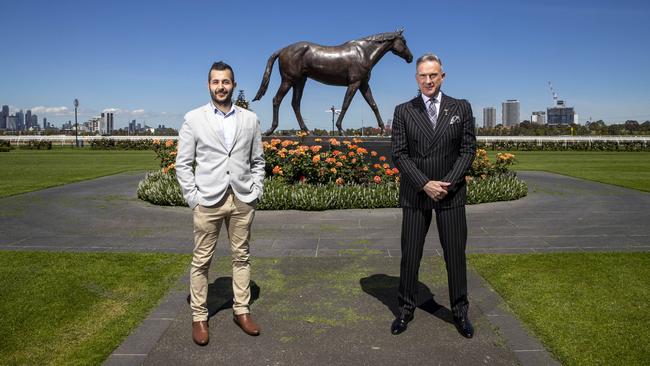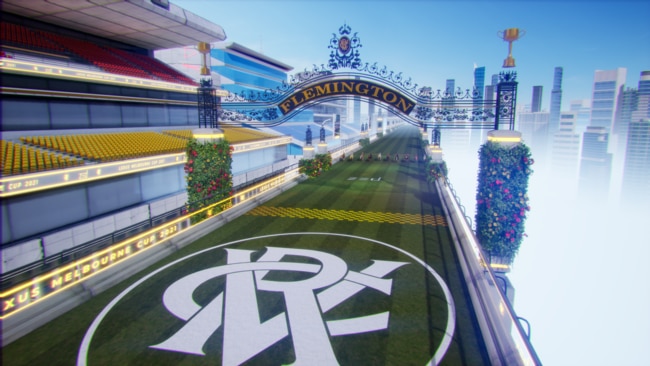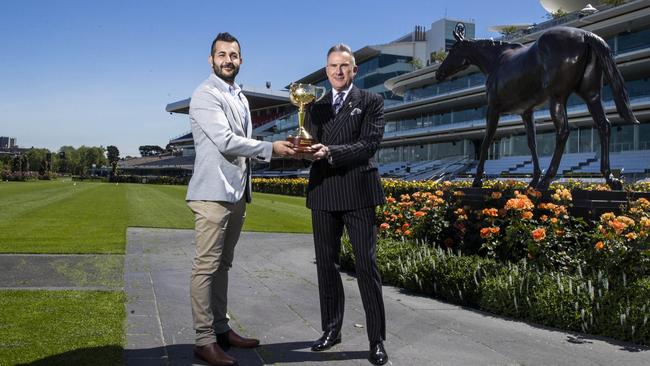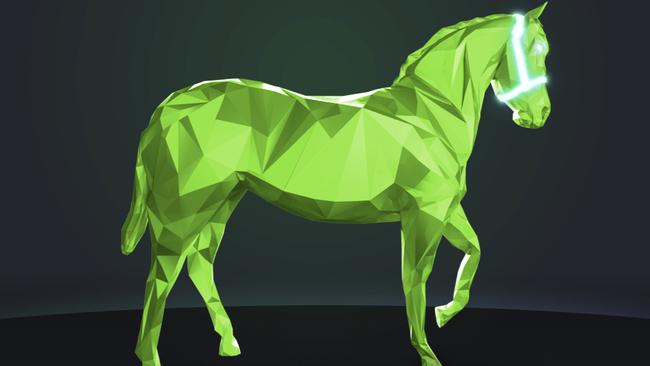Melbourne Cup enters blockchain by clinching virtual deal with crypto racing unicorn Zed Run
A $1bn Australian start-up has become the talk of the global racing industry as it breeds, sells and races virtual thoroughbreds. A stallion recently sold for $562,000 via cryptocurrency.

Business
Don't miss out on the headlines from Business. Followed categories will be added to My News.
Forget the traditional Melbourne Cup, The Everest or Cox Plate. The hottest thing in racing now has thousands of events on a virtual floating track daily and streamed by millions of viewers around the world, all powered by the blockchain.
It has celebrities like Mike Tyson, Paris Hilton and rappers Ja Rule and MC Hammer as owners of virtual horses, which – just like physical thoroughbreds – are bred, bought and sold in an industry turning over hundreds of millions of dollars annually.
And it is all the work of an Australian start-up that took inspiration from a poster at a Chinese takeaway and in less than two years has its parent firm quietly reaching the coveted $1bn “unicorn” valuation status.
Zed Run is a digital horse racing platform founded by a couple of former IT consultants at Virtually Human Studio that has captured the imagination of crypto gaming connoisseurs.
The business marries old-fashioned horse racing buying, selling and breeding nous with blockchain technology that also taps into the non-fungible tokens (NFTs) craze, but with a difference.

NFTs such as digital art and collectibles surged in popularity earlier this year, and are often traded using cryptocurrency. But instead of a collectable sitting there hopefully appreciating in value, a Zed Run horse is a “breathing NFT” that has its own bloodline, races, breeds and has a virtual life of its own.
There are now more than 100,000 horses in the Zed Run ecosystem, and up to $20m is traded on the secondary horse market daily.
Races take place on Zed Run’s website and on streaming platform Twitch. There are 12 horses in each race, the outcome of which is decided by more than 10,000 different outcomes from the company’s algorithms.
Individual horses have been bought and sold for hundreds of thousands of dollars – last week Zed Run achieved its biggest individual sale last when a stallion called Breathless Edge was bought for $US420,590 ($561,845) – via cryptocurrency – and a stable of a handful of horses recently sold for $US2.3m.
Users typically are younger than traditional horse racing fans, being aged between 18 and 45. Stable owners have become celebrities in their own right, and the merits and performance of horses have even been discussed by broadcasters in the US, a major Zed Run market, on specially devised shows streamed online.
It is what co-founder Rob Salha describes as the “concept of blended reality”.
“You’re watching the screen, you’re cheering, just like you would with a typical racehorse and it’s earning your income potentially just like that of a real racehorse. And everything else is inclusive – breeding, trading, being strategic where to race (and over) what distance, who to compete against and so on.”
The old world and the new will come crashing together next week after the Victoria Racing Club, custodians of the Melbourne Cup carnival, clinched a deal for their famous Flemington racetrack to feature on Zed Run.

A recreation of Flemington will feature in a metaverse online world in Decentraland, a 3D virtual world built and powered by the Ethereum blockchain, with attendees inside ZED HQ able to watch a live stream of Australian horse racing and enjoy music provided for the virtual event by DJ Havana Brown. There will also be a virtual NFT art gallery, race day fashion and a collection of nostalgic Melbourne Cup NFTs will be auctioned off.
It will open up traditional horse racing to a different audience, says VRC chair Neil Wilson. “This partnership sees us embracing the new digital age to bring the magic of cup week to audiences old and new.”
It was the lucrative part of real horse racing going on outside the spotlight that led to Salha and co-founder Chris Laurent coming up with what is now Zed Run.
Laurent lives in the Hunter Valley, a renowned racehorse breeding region, and had dropped into his local Chinese takeaway one night. He spied a picture of a horse with a “$15,000 sign” on a noteboard and walked over.
“It wasn’t $15,000 to buy the racehorse, it was $15,000 to breed with it. Then I read the fine print and it said it will breed up to 200 times per year. Doing the maths, I thought ‘wow, what a lucrative business stud farms are’. That part of the industry is more lucrative than a bunch of mates going to buy a horse and racing it.

“So I thought it was fascinating that we could replicate the horse racing industry to a degree and that potentially it could be more profitable to develop that in the real world.”
Salha had been an accountant at Ernst & Young and then other marketing and digital roles, coming across Laurent who was working for wagering technology firm BetMakers in product innovation, while the pair had been technology industry consultants.
“Chris was … the mad scientist in the corner of the room, coming up with wacky ideas. But he’s extremely creative and what he noticed was at 10 in the morning when the horse racing markets open up all these people start placing bets on races, there’s all this engagement. But by 3pm it all dies down,” says Salha.
“And then we thought how cool would it be to build this 24/7 ecosystem of horse racing of thousands of races a day, where each one of those race horses digitally was actually owned by someone, and that those digital race horses were seen as a store of value.”
Zed Run launched in January 2019, with original horses selling for up to $100. A couple of months later, the horses were selling on the secondary market.
“All of a sudden we get our race horses being sold for $500, $1000 and $2000 and everyone is like ‘holy shit like we are onto something’, because people see these as a valuable commodity or a valuable asset. And that’s when we started breeding, launching the breeding ecosystem,” says Salha.
As in the real world, owners can pay for their horses to breed, and also pay fees to enter races. The fastest are Genesis horses, of which there are only 38,000, though they can be bred. Horses have benchmark ratings and points are awarded. The better the racing performance, the more that can be charged for breeding, and prize money is paid in cryptocurrency.
“One of the reasons we did choose horse racing is because it‘s the most universal language out there; you own a racehorse, it crosses the line first, you win,” says Laurent.
Zed Run sells new horses in limited edition “drops”. The last one in April saw $25m worth of sales in four hours.
That also brought investor attention, and Zed Run clinched a $US20m Series A funding round in July led by US-based TCG Capital Management and with Andreessen Horowitz and Red Beard Ventures. Salha says the deal means Zed Run is close to unicorn status, though local investment sources say it is worth more than $1bn.
The money is being used to keep expanding the business. Gambling companies have also contemplated approaching Zed Run to field markets on its races.
Salha and Laurent want to keep building Zed Run from Australia, though Salah says the duo “knocked on about 20 doors locally and everyone said no from a venture capital point of view and we had to go overseas. They’re a lot more aggressive and closer to the dotcom boom, whereas a lot of VC money in Australia is old money.
Laurent says the business is only “about 30 per cent of where we want to be” and deals like the Melbourne Cup tie-in and a recent one with the NASCAR racing series in the US will help keep expanding Zed Run’s profile. There is also potential outside of horse racing in the entertainment sector.
“We want to be one of those products that is the catalyst for mainstream adoption. It shouldn‘t matter to the user that we are built on the blockchain or that owning a racehorse is (also) owning a NFT,” says Laurent.
“Once we get a product in a position where we’re ready to go really hard to market, that’s when you add things absolutely everywhere. We will be a consumer grade product, we will be part of pop culture, we’ll be on billboards and we’ll be on movie trailers when you go into the cinemas. That’s the vision we have.”
Originally published as Melbourne Cup enters blockchain by clinching virtual deal with crypto racing unicorn Zed Run



